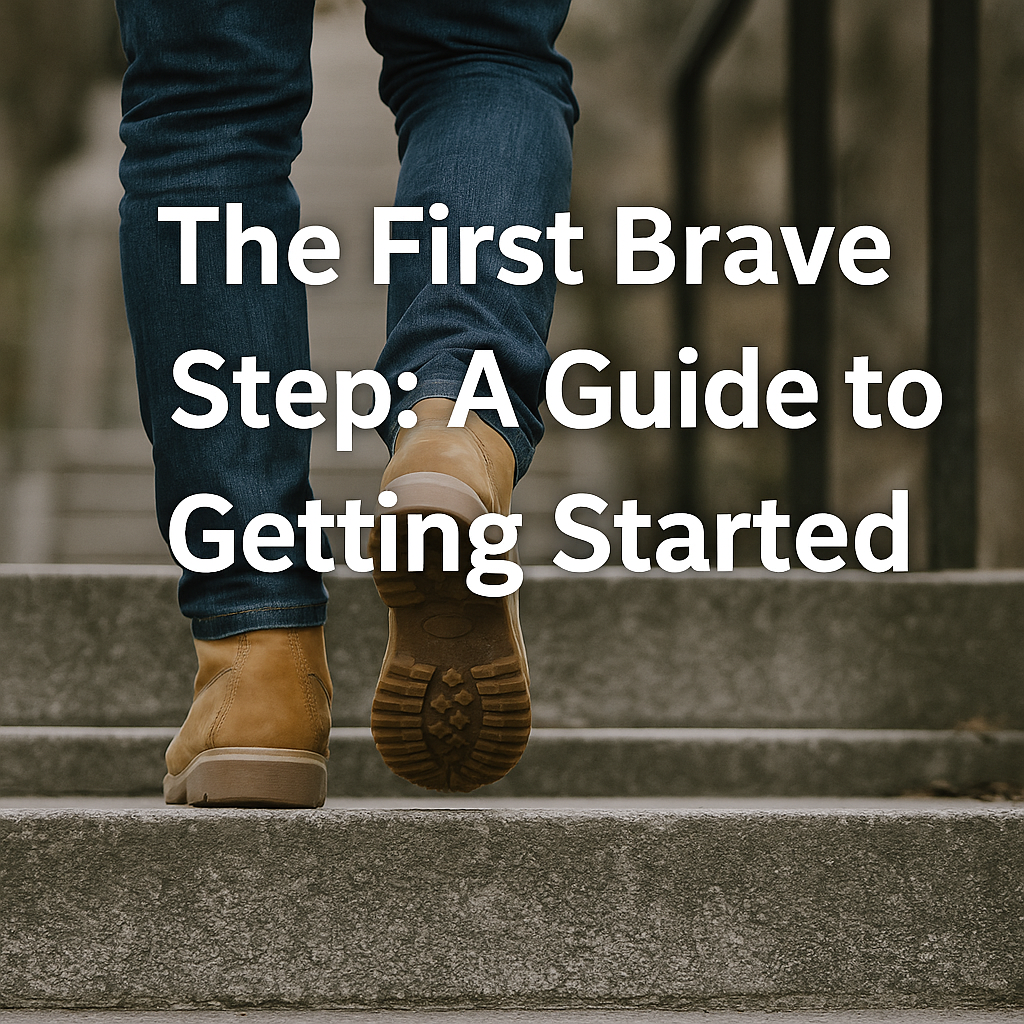The First Brave Step: A Guide to Getting Started

Starting something new can feel like standing at the edge of a cliff, peering into an abyss. That mix of excitement and terror, the sheer uncertainty of what lies ahead, can be paralyzing. We've all been there, haven't we? This blog post is designed to be your hand to hold as you take that first leap of faith. It’s about understanding the anxiety of new beginnings, breaking down the barriers that hold you back, and equipping you with the practical tools and encouragement you need to embark on your journey.
In this post, we will delve into the common anxieties associated with starting something new, offer actionable strategies to overcome fear, explore the power of intuition, and highlight the importance of action over analysis. We’ll also discuss how taking that first leap can unexpectedly open doors you never knew existed. Think of it as your personal guide to turning hesitation into momentum. And it mirrors the discussion we had in our latest podcast episode "24: You’ll Never Know If You Never Go: The Power of Saying Yes," where we explored the transformative power of simply saying yes to the unknown.
The Anxiety of New Beginnings
Let's face it: new beginnings are scary. Even when we consciously desire change, the prospect of stepping outside our comfort zone can trigger a cascade of anxious thoughts. Why is this? Several factors contribute to this phenomenon:
- Fear of Failure: This is perhaps the most prevalent anxiety. The thought of investing time, energy, and resources into something only to fall short of our goals can be incredibly daunting. We worry about the potential disappointment, the perceived judgment of others, and the impact on our self-esteem.
- Uncertainty: The unknown is inherently unsettling. When we embark on a new path, we relinquish the familiar sense of control and predictability. This lack of certainty can fuel anxiety as we struggle to anticipate potential challenges and outcomes.
- Imposter Syndrome: This insidious feeling creeps in and tells us that we're not qualified or capable enough to succeed in our new endeavor. We question our skills, knowledge, and experience, leading to self-doubt and a fear of being exposed as a fraud.
- Loss of Identity: Starting something new can sometimes feel like shedding a part of our old selves. We may worry about how our new pursuits will impact our relationships, our social standing, and our overall sense of who we are.
- Past Experiences: Previous failures or negative experiences can cast a long shadow, making us hesitant to take risks again. We may unconsciously project past disappointments onto our current situation, hindering our ability to move forward with optimism.
Understanding the root causes of these anxieties is the first step towards overcoming them. By acknowledging and validating our fears, we can begin to address them in a rational and constructive manner.
Why Taking the First Step Is the Hardest
There's a famous saying that "a journey of a thousand miles begins with a single step." While cliché, it perfectly encapsulates the difficulty of getting started. That initial step often feels the most challenging because:
- Inertia: It takes considerable effort to overcome the force of inertia, which is the tendency to remain in a state of rest or uniform motion. Breaking free from our existing routines and habits requires a conscious decision and a deliberate effort to change.
- Perfectionism: The desire to have everything perfectly planned and prepared before starting can be a major obstacle. We get caught up in endless research, planning, and preparation, delaying the actual launch of our endeavor.
- Analysis Paralysis: Overthinking and excessive analysis can lead to paralysis. We get bogged down in the details, weighing every possible scenario and outcome, ultimately becoming too overwhelmed to take any action.
- Lack of Confidence: Doubt and insecurity can erode our confidence, making us hesitant to put ourselves out there. We may fear criticism, rejection, or simply not being good enough.
- The "All or Nothing" Mentality: We often believe that we need to commit fully and completely to a new endeavor from the outset. This "all or nothing" mentality can be intimidating, making it difficult to take even the smallest steps.
Overcoming these hurdles requires a shift in perspective. Instead of focusing on the magnitude of the entire journey, concentrate on taking one small, manageable step at a time. Celebrate each milestone, no matter how small, to build momentum and maintain motivation.
Episode Recap: Saying Yes to the Unknown
In episode 24, we discussed the pivotal moment when a simple "yes" opened doors I never imagined. I shared a personal story of overcoming fear and embracing the unknown, emphasizing that motivation often arises from action, not the other way around. The episode touched on the importance of trusting your gut, letting go of overthinking, and recognizing that taking that first brave step is often the key to unlocking unexpected opportunities. To summarize the points covered in the episode:
- Sometimes motivation isn't something you wait for, but something you find once you start
- Stop overthinking
- Trust your gut
- Take that first brave step
Practical Steps to Overcome Fear
Fear is a natural human emotion, but it doesn't have to dictate our actions. Here are some practical steps to overcome fear and take that first brave step:
- Acknowledge and Validate Your Fears: Don't dismiss or suppress your fears. Instead, acknowledge them, validate their existence, and try to understand their root causes.
- Break Down the Task: Divide your overarching goal into smaller, more manageable steps. This makes the task less overwhelming and provides a sense of accomplishment as you complete each step.
- Focus on the Process, Not the Outcome: Shift your focus from the potential outcome to the process of learning and growing. This reduces the pressure to succeed and allows you to enjoy the journey.
- Embrace Imperfection: Accept that mistakes are inevitable and view them as learning opportunities. Don't let the fear of failure paralyze you.
- Visualize Success: Use visualization techniques to imagine yourself successfully completing your goal. This can boost your confidence and reduce anxiety.
- Seek Support: Talk to friends, family, mentors, or a therapist about your fears and anxieties. Sharing your concerns can provide valuable perspective and support.
- Challenge Negative Thoughts: Identify and challenge negative thought patterns that contribute to your fear. Replace them with more positive and realistic thoughts.
- Take Action, Even Small Action: The best way to overcome fear is to take action, even if it's just a small step. Each step you take will build your confidence and reduce your fear.
- Celebrate Small Victories: Acknowledge and celebrate each accomplishment, no matter how small. This reinforces positive behavior and motivates you to continue moving forward.
Trusting Your Gut: The Power of Intuition
Intuition, often referred to as your "gut feeling," is a powerful tool that can guide you in making decisions and navigating new situations. It's that inner voice that whispers wisdom, even when your rational mind struggles to make sense of things. Learning to trust your intuition can be invaluable when embarking on a new path.
Here's why intuition is so important:
- Access to Subconscious Knowledge: Your intuition draws upon a vast reservoir of subconscious knowledge, experiences, and observations that your conscious mind may not be aware of.
- Quick Decision-Making: In situations where you need to make a quick decision, your intuition can provide valuable guidance when time is limited for rational analysis.
- Emotional Intelligence: Intuition is closely linked to emotional intelligence, allowing you to perceive and understand the emotions of yourself and others, leading to more empathetic and effective interactions.
- Creativity and Innovation: Intuition can spark creative insights and innovative ideas that may not emerge through purely logical thinking.
- Authenticity: Trusting your intuition can help you stay true to yourself and make decisions that align with your values and beliefs.
To cultivate your intuition:
- Pay Attention to Your Physical Sensations: Notice how your body reacts to different situations and decisions. Does a particular choice feel right in your gut? Do you experience physical tension or discomfort when considering a certain option?
- Practice Mindfulness: Mindfulness practices, such as meditation, can help you quiet your mind and become more attuned to your inner voice.
- Reflect on Past Experiences: Look back on past decisions and situations where you relied on your intuition. What were the outcomes? What did you learn?
- Create Space for Reflection: Set aside time each day for quiet reflection and introspection. This allows you to connect with your inner wisdom.
- Trust Your Initial Instincts: Often, your first gut reaction is the most accurate. Avoid overthinking and second-guessing yourself.
Stop Overthinking: Action Over Analysis
Overthinking is a common trap that can prevent us from taking action. We get caught up in analyzing every possible scenario, weighing the pros and cons endlessly, and ultimately becoming paralyzed by indecision. To break free from this cycle, we need to prioritize action over analysis.
Here's why action is more important than excessive analysis:
- Learning Through Experience: The best way to learn and grow is through experience. Taking action, even if it's imperfect, provides valuable feedback and insights that you can't gain through theoretical analysis alone.
- Building Momentum: Action creates momentum. Each step you take, no matter how small, builds upon the previous one, making it easier to continue moving forward.
- Overcoming Fear: Taking action is the most effective way to overcome fear. The more you do, the more confident you become in your ability to handle challenges and uncertainties.
- Real-World Validation: Theoretical analysis can only take you so far. You need to test your ideas and assumptions in the real world to see what works and what doesn't.
- Avoiding Perfectionism: Overthinking is often driven by a desire for perfection. By prioritizing action, you can let go of the need to have everything perfectly planned and prepared.
Strategies to stop overthinking and take action:
- Set a Deadline: Give yourself a deadline for making a decision or taking action. This creates a sense of urgency and prevents you from getting bogged down in endless analysis.
- Embrace Imperfection: Accept that things don't have to be perfect to get started. Focus on progress, not perfection.
- Take Small Steps: Break down the task into smaller, more manageable steps. This makes it easier to take action and reduces the feeling of overwhelm.
- Focus on the Next Action: Instead of worrying about the entire project, focus on the next action you need to take. This keeps you focused and prevents you from getting lost in the details.
- Practice Mindfulness: Mindfulness practices can help you become more aware of your thoughts and feelings, allowing you to identify and interrupt overthinking patterns.
- Just Start: Sometimes, the best way to overcome overthinking is to simply start. Don't wait for the perfect moment or the perfect plan. Just take the first step.
The Unexpected Doors That Open
One of the most rewarding aspects of taking that first brave step is the unexpected doors that can open along the way. When you step outside your comfort zone and embrace the unknown, you create opportunities that you never could have imagined.
Here are some of the unexpected doors that may open:
- New Relationships: Starting something new often leads you to connect with like-minded individuals who share your interests and passions. These relationships can provide valuable support, mentorship, and collaboration opportunities.
- New Skills and Knowledge: Embracing new challenges forces you to learn and grow. You may acquire new skills and knowledge that enhance your abilities and expand your horizons.
- New Perspectives: Stepping outside your comfort zone can broaden your perspective and challenge your assumptions. You may gain a new appreciation for different cultures, viewpoints, and ways of doing things.
- Increased Confidence: Each time you overcome a challenge and achieve a goal, your confidence grows. This increased confidence empowers you to take on even bigger challenges and pursue your dreams with greater conviction.
- Unexpected Opportunities: Sometimes, the most exciting opportunities arise from unexpected places. By being open to new experiences and possibilities, you may stumble upon opportunities that you never could have planned for.
The key is to remain open and receptive to the opportunities that come your way. Be willing to explore new paths, embrace new challenges, and connect with new people. You never know what doors might open when you take that first brave step.
Encouragement: You'll Never Know If You Never Go
The truth is, you'll never know what you're capable of until you try. You'll never know what opportunities await you until you take that first step. You'll never know the heights you can reach until you dare to climb. This is why taking that first brave step is so crucial. It's about embracing the unknown, overcoming your fears, and believing in yourself.
Remember that:
- You are stronger than you think.
- You are more capable than you believe.
- You are worthy of your dreams.
Don't let fear or doubt hold you back from pursuing your passions and reaching your full potential. Take that first brave step, and you may be surprised at what you discover.
Call to Action: Taking Your First Brave Step Today
So, what's your first brave step going to be? What's one small action you can take today to move closer to your goal? Whether it's starting a new project, learning a new skill, or simply reaching out to someone who inspires you, take that step today. Don't wait for the perfect moment or the perfect plan. Just start.
To help you on your journey, consider these actions:
- Write down one thing you have been putting off doing.
- Break the task down into smaller, achievable steps.
- Do the first step, now!
Community Support and Resources
You're not alone on this journey. There's a vibrant community of people who are also striving to overcome their fears and pursue their dreams. Connect with others who share your passions, seek support from mentors or coaches, and utilize the many resources available to help you succeed.
Here are some resources that may be helpful:
- Online Communities: Join online forums, social media groups, or online communities related to your interests or goals. These communities can provide valuable support, encouragement, and advice.
- Mentors and Coaches: Seek out mentors or coaches who have experience in your field or area of interest. They can provide guidance, feedback, and support as you navigate your journey.
- Books and Articles: Read books and articles on topics such as overcoming fear, building confidence, and achieving your goals. There's a wealth of information available to help you succeed.
- Workshops and Seminars: Attend workshops and seminars that provide practical skills and strategies for overcoming challenges and achieving your goals.
- Therapists and Counselors: If you're struggling with anxiety, fear, or other emotional challenges, consider seeking support from a therapist or counselor. They can provide a safe and supportive space for you to explore your feelings and develop coping strategies.
Remember, seeking support is a sign of strength, not weakness. Don't hesitate to reach out to others for help and guidance as you pursue your dreams.
Taking the first brave step is never easy, but it's always worth it. By understanding your fears, breaking down the barriers that hold you back, trusting your intuition, and prioritizing action over analysis, you can unlock your full potential and create a life filled with purpose, passion, and fulfillment. Remember, you'll never know if you never go. And as we discussed in episode 24, sometimes all it takes is a simple "yes" to open up a world of possibilities.






